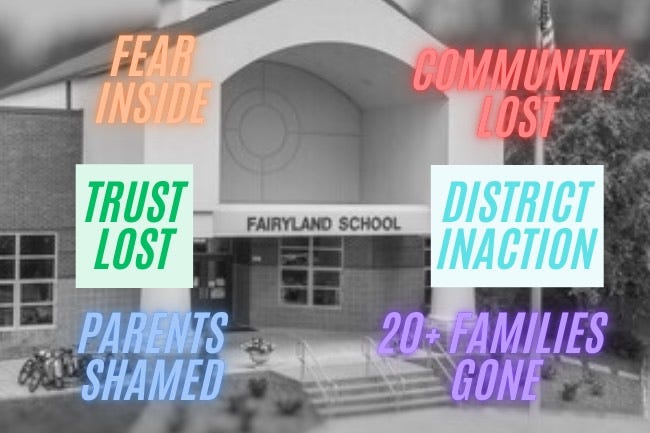Fairyland Lost: The Quiet Crisis on Lookout Mountain
A Walker County School's Descent into Administrative Tyranny
Once upon a time, Fairyland Elementary was the little mountain school everyone bragged about — the kind of place where parents wanted to be involved, where teachers taught with joy and stayed until retirement, and where kids looked forward to the classroom, not just recess. It was the rarest of public schools — one that felt personal.
It felt like a school should—a partnership between parents, teachers, and the community, built around and for children.
Today, the fairy tale has been twisted. And the ending, unless something changes, won't be a happily ever after.
Now? It's a kingdom of one. A place where one person's obsession with power and control has suffocated everything that once made Fairyland magical.
The signs were small at first—until they weren't. Parents — the very people who fund, volunteer, and raise these kids — were locked out of their own school's open house. The principal didn't want them wandering the halls. No, they had to wait outside until she gave the green light — a chilling metaphor for everything else happening there.
Then came the punch cards. Want to eat lunch with your child? Line up for your punch card, folks. Volunteer ten times, and you earn that right. That's not parental engagement — it's extortion with a rewards card.
But none of this was ever about meaningful engagement. It was about control. Control over parents. Control over teachers. Control over children.
Teachers got the message early. Ask questions, and you're transferred—or worse. Speak honestly, and you'll find your name next on the chopping block. One staff meeting ended with the principal half-joking, "This could be you next." Only nobody laughed—because everyone knew it was true.
When one parent had the nerve to ask if teachers really voted on a start time change, she got her answer. Not from the staff—but from the principal, who publicly shamed her in an all-school email. That wasn't a slip. That was standard operating procedure. Humiliation as deterrence. Transparency as threat.
Then it happened again.
A parent, desperate and concerned, emailed school board members with frank complaints and concerns about the situation. That email—sent in confidence, also contained private details about a child’s Individualized Education Program (IEP)—was inexplicably passed straight to the principal by board members who apparently forgot what confidential means.
The principal? She did what bullies always do when handed a secret: She used it. The email was read—out loud—at a school staff meeting. A parent’s private plea turned into a public flogging. This wasn't merely a breach of protocol; it was a calculated act of public humiliation, yet another warning to any parent who might dare to challenge the regime.
That’s not just a bad decision. It’s also morally repugnant. But at Fairyland, just standard operating procedure.
Meanwhile, the casualties keep stacking up. A medically fragile child’s feeding tube? Ignored—twice—because there “wasn’t staff.” Another child quietly placed in special ed services—without parental knowledge or consent. These aren’t clerical errors. They’re violations—of law, of trust, of basic human decency.
Meanwhile, teachers are routinely denied their legally mandated duty-free lunch under the excuse of a county waiver—meant for unforseen circumstances, not daily operations. When parents offered to help, they were dismissed as “disrespectful.” Yet somehow, the same parents get blamed for the sub shortage—and then asked to cover classrooms.
While children suffered, the principal stayed laser-focused on the only thing that really mattered: her control. Field trips? Cut. Classroom parties? Canceled. City partnerships? Terminated. Community input? Erased.
Not even the school's plummeting rankings could shake her grip. When Fairyland dropped from 8th to 21st best elementary school in Georgia—a free fall for a school used to high rankings—the principal's response was breathtaking in its arrogance: "That's not accurate." No plan. No ownership. Just denial.
The truth? Parents are fleeing or making alternative plans. 22 families. Fifty-two children—gone or looking to exit or not return. Teachers, once proud to work here, now whisper in parking lots, worried who's listening or if they can speak. The community—once the heart of this school—is shut out, locked out, and worse, blamed.
And where’s the district? The superintendent? Watching it happen. Fully aware. Completely silent. Too loyal, too incompetent, too weak, or just too scared to act. Betting that this will blow over.
It won’t.
What’s happening at Fairyland is not some isolated management issue. It’s a textbook example of what happens when administrators forget who schools serve—when personal power matters more than students, when leaders mistake control for leadership.
This school board, newly elected or not, has a choice. Pretend this isn’t happening—or stand up and finally, finally fight for the children, the parents, the teachers—the people who’ve all stopped hoping anyone is listening to their pleas. But there’s still time. Time to choose accountability over cowardice. Children over politics. Truth over spin.
Fairyland’s story isn’t finished. There’s still time for a better ending—but it requires courage. It requires leadership. It requires understanding that a school doesn’t belong to a principal, or a superintendent. It belongs to the people—the community that built it, the parents and teachers who sustain it, and the children whose futures depend on it.
And right now, those children deserve better—much better—than what they’re getting.
The only question left is whether anyone in power has the spine to do something about it.
Disclaimer:
This article is based on information obtained from individuals who, due to legitimate concerns of reprisal or personal safety, have requested anonymity. The absence of direct citations or linked sources is a measure to protect these individuals. While the information presented has been corroborated to the extent possible, readers should be aware that the use of anonymous sources can impact the ability to independently verify all details. The decision to include such information aligns with journalistic standards that permit anonymity when it serves the public interest and when the information cannot be obtained through other means.



